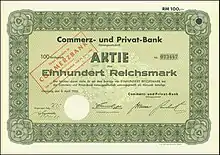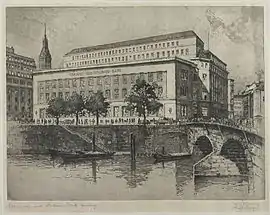Commerzbank
Commerzbank Aktiengesellschaft is a major German bank operating as a universal bank, headquartered in Frankfurt am Main. In the 2019 financial year, the bank was the second largest in Germany by the total value of its balance sheet.[4] The bank is present in more than 50 countries around the world and provides almost a third of Germany's trade finance.[5] In 2017, it handled 13 million customers in Germany and 5 million customers in Central and Eastern Europe. Commerzbank is a member of the Cash Group.[6] 15% of the shares are owned by the Federal Republic of Germany and 85% are in free float.
 | |
| Type | Aktiengesellschaft |
|---|---|
| FWB: CBK LSE: CZB | |
| ISIN | DE000CBK1001 |
| Industry | Financial services |
| Founded | February 26, 1870 in Hamburg, Germany[1] |
| Founders | Theodor Wille et al.[1] |
| Headquarters | Kaiserplatz, , |
Area served | Worldwide |
Key people |
|
| Services | |
| Revenue | |
| Total assets | |
| Total equity | |
Number of employees | 49,174 (September 2018) |
| Capital ratio | 12.9% (2018) |
| Rating |
|
| Website | commerzbank.com |
| Footnotes / references Commerzbank Investor Relations | |
The bank has been subject to several corruption investigations,[7][8] paying $US1.5 billion in fines in 2015.[8]
History



Empire
On February 26, 1870, mainly Hanseatic merchants, merchant bankers and private bankers founded the Commerzbank and Disconto Bank in Hamburg. Shipowner C. Woermann was the first chairman of the supervisory board of Commerz- und Disconto-Bank from 1870.[9] In the founding consortium, the following banks were represented:
- Alexander Mendelssohn (Bankhaus Mendelssohn & Co., Berlin)
- Ludwig Erdwin Amsinck (von der Firma L.E. Amsinck & Co., New York City)
- Conrad Hinrich Donner III. (Conrad Hinrich Donner, Altona)
- Carl Georg Heise (Carl Geo. Heise, Hamburg)
- Georg Hesse (Hesse, Newman & Co., Altona)
- Leopold Lieben (Lieben Königswarter, Hamburg)
- Jacques Emile Louis Alexander Nölting (Emile Nölting & Co., Hamburg)
- Albrecht Percy O'Swald (Wm. O'Swald & Co., Hamburg)
- Ernst Friedrich Sieveking (Vertreter von B.H. Goldschmidt, Frankfurt am Main, und Mendelssohn & Co., Berlin)
- Siegmund Warburg (M. M. Warburg & Co., Hamburg)
- Theodor Wille (Theodor Wille, Hamburg)
- Carl Woermann (C. Woermann, Hamburg)
In 1873, the subsidiary London and Hanseatic Bank was founded, which was active until the First World War. In Germany, Commerzbank was initially active in Hamburg until 1897 branches were built in Berlin and Frankfurt am Main. After the merger in 1905 with the Berliner Bank, founded in 1871, the focus shifted increasingly to Berlin.
Weimar Republic
In 1920, Commerzbank AG merged with Mitteldeutsche Privatbank AG in Magdeburg to form Commerz- und Privat-Bank AG, thereby gaining a dense branch network in the provinces of Saxony and Thuringia. In the early 1920s, many smaller banks were taken over (including the Hessian Bank Association) and in 1929 it merged with the Mitteldeutsche Creditbank in Frankfurt am Main. In 1927 Commerzbank took a large loan of 20 million dollars in ten-year gold notes at 5.5% at the American Chase National Bank.
In 1931, during the Great Depression Commerzbank, ran into difficulties. The Reich government under Chancellor Heinrich Brüning decided in February 1932 to merge Commerzbank with Barmer Bankverein, which had a dense branch network in northern and western Germany. Majority of shares of this bank were bought by the government and the Reichsbank.
Third Reich
In 1937, the nationalized shares were then transferred back to private shareholders. In 1940, the name Commerzbank Aktiengesellschaft, which had already been used in public, was adopted and the logo changed to "C" with side wings. Through Aryanization of the property of Jews displaced or murdered during the Holocaust, Commerzbank participated and benefited mostly through brokerage commissions. From 1940 to 1944, Commerzbank opened several subsidiaries in countries occupied by the German Reich, including the Netherlands, Belgium, Estonia and Latvia. Commerzbank fell back from third to fourth place among the major banks by total assets in the 1940s.
Allied Occupation
With the division of Europe after World War II, three regional banks were united in 1958 to form Commerzbank AG, which had its headquarters in Düsseldorf. Commerzbank stepped up its economic financing activities and started expanding around the globe. From 1970 onwards, the bank's administrative activities were shifted to Frankfurt am Main, which has been its legal domicile since 1990.[10]
- British Occupation Zone
- Bankverein Westdeutschland in Düsseldorf
- Hansa-Bank in Hamburg
- Merkur-Bank in Hannover
- Holsten-Bank in Kiel
- French Occupation Zone
- Mittelrheinische Bank in Mainz
- American Occupation Zone
- Mitteldeutsche Creditbank in Frankfurt am Main
- Bankverein für Württemberg-Baden in Stuttgart
- Bayerische Disconto-Bank in Nürnberg
- Bremer Handels-Bank in Bremen
Federal Republic
Commerzbank suffered reversals in a disastrous foray into investment banking in the first half decade of the 2000s and eventually shut down its Commerzbank Securities investment banking unit run by Mehmet Dalman and Roman Schmidt after Chairman Klaus-Peter Müller labelled it a "problem child" and a review by consulting firm Mercer Oliver Wyman which concluded that Commerzbank Securities lacked a viable business model.[11][12][13][14] What was left of Commerzbank Securities was folded into a division of the commercial bank called Corporates and Markets.
Acquisition of Dresdner Bank
Further mergers, acquisitions and restructures saw the group grow to servicing over 4 million customers in 1998, 6 million customers in 2001 and 15 million post the global financial crisis oriented takeover of Dresdner Bank from Allianz for €5.5 billion in 2008. Commerzbank was hit hard by the financial crisis and received an €18 billion ($22.3 billion) state bailout.[15] In September 2016, Commerzbank planned to cut 9,600 jobs or about a fifth of its workforce in 4 years.[16]
In late 2019, Commerzbank entered into talks with Petrus Advisers to buy its 7.5% stake in Comdirect and take over the entire online bank.[17]
Shareholders and management
As of December 2018, the bank's two largest shareholders were the Government of Germany (15.6%) and Cerberus Capital Management (5.01%).[18] In July 2020, the bank's chairman Stefan Schmittmann announced that he will be resigning by August 3. Subsequently, Martin Zielke, Commerzbank's chief executive said that he is ready to step out of its function. The decisions were made after in June 2020, Cerberus attacked the firm's leadership team, "significant change at the supervisory board, the management board and the company’s strategic plan to stop a 'downward spiral' caused by what the investor said were bloated costs, low profits and managerial inaction."[19] In the Q2 of 2020, the company made an operating profit of €205 million; it was 34 per cent less compared to the same period of 2019. "According to people familiar with the matter", the bank's profit was more affected by the insolvency of Wirecard than the economic effects of the COVID-19 pandemic.[20] In September 2020, the bank named Deutsche Bank AG German retail head Manfred Knof to take over as the chief executive officer on Jan 1, 2021.[21]
Controversies
For more than a decade, Commerzbank was involved in laundering hundreds of billions of U.S. dollars out of Iran, Sudan and Myanmar, against United States sanctions.[22] Commerzbank agreed to pay $US1.5 billion in fines and dismiss several employees for their role in laundering US$253 billion, and for helping the Japanese company Olympus Corporation orchestrate accounting fraud.[8][23]
In 2017, Frankfurt prosecutors, together with federal crime police and tax officials, conducted searches of Commerzbank offices as well as the flats of three suspects in Frankfurt and nearby Hanau.[7] The police raid was about a "tax evasion probe in which several current and former managers are suspected of evading €40 million in taxes via dividend stripping, also known as "cum-ex" transactions".[24] The investigation also extended to trades in 2008 at Dresdner Bank, which was taken over by Commerzbank in 2009.[24] Commerzbank said "it proactively notified the authorities with the preliminary results of that investigation and is cooperating fully".[24] In 2019, Cologne prosecutors again raided Commerzbank's Frankfurt headquarters as part of the criminal investigation.[25]
It was announced in July 2019 that Commerzbank was being investigated by the European Central Bank and BaFin for facilitating its subsidiary mBank's toxic financial product offering in Poland, as well as for the linked potential tax evasion resulting from Commerzbank's financing of mBank's CHF-linked toxic financial products.[26][27]
Restructuring
In 2021 the bank announced it will reduce the number of branches in Germany from 790 to 450, leading to a 10,000 cut in jobs or about one in three of its German workforce.[28]
References
- Manfred Pohl, Sabine Freitag, ed. (1994). Handbook on the History of European Banks. Brookfield: Edward Elgar Publishing. p. 375. ISBN 1-85278-919-0.
- "Commerzbank Board of Managing Directors". Commerzbank. January 1, 2021. Retrieved January 20, 2021.
- "Supervisory Board". Commerzbank. August 3, 2020. Retrieved August 3, 2020.
- "Commerzbank fourth-quarter net profit jumps 51 pct, tops expectations". www.cnbc.com. Feb 14, 2019. Retrieved Feb 14, 2019.
- "How Germany Might Sell Its Commerzbank Stake: Four Scenarios". Bloomberg.com. 2018-03-27. Retrieved 2018-03-27.
- http://www.cashgroup.de/
- Sims, Tom. "German prosecutors raid Commerzbank in tax evasion probe". Reuters. Retrieved 2018-05-03.
- Protess, Ben (12 March 2015). "Commerzbank of Germany to Pay $1.5 Billion in U.S. Case". The New York Times.
- Commerzbank's history on Commerzbank AG site.
- History from 1870 until today on Commerzbank AG site.
- Althaus, Sarah (2004-09-30). "Commerzbank unit chief 'to quit'". FT.com. Archived from the original on 2013-06-24. Retrieved 2013-10-26.
- "Commerzbank culls 900 as losses grow". Efinancialnews.com. 2004-11-09. Retrieved 2013-10-26.
- Landler, Mark (10 November 2004). "Major Bank in Germany Cutting Back Its Trading" – via NYTimes.com.
- "A weary lender". The Economist.
- Kanishka Singh (January 26, 2018), Goldman, Barclays, SocGen interested in Commerzbank unit: Handelsblatt Reuters.
- "Commerzbank To Cut 9,600 Jobs By 2020". September 30, 2016.
- Tom Sims and Hans Seidenstuecker (December 30, 2019), Commerzbank in talks to buy Petrus Advisers stake in Comdirect: source Reuters.
- "Commerzbank (CBK)". Marketscreener.com. Dec 27, 2018. Retrieved Dec 27, 2018.
- Storbeck, Olaf (3 July 2020). "Commerzbank chairman and chief to quit in Cerberus row". Financial Times. Retrieved 5 August 2020.
- Storbeck, Olaf (5 August 2020). "Commerzbank takes greater loan loss from Wirecard than Covid-19 debt". Financial Times. Retrieved 5 August 2020.
- "Commerzbank Names Deutsche Bank's Knof CEO to Lead Cost Cuts". www.bloomberg.com. Retrieved 2020-09-28.
- Schroeder, Peter (12 March 2015). "German bank to pay $1.45B to settle money laundering charges".
- "Justice Dept.'s Criminal Information With Commerzbank". Document Cloud.
- Maria Sheahan; Tom Sims; Hans Seidenstuecker (14 November 2017). "German prosecutors raid Commerzbank in tax evasion probe". Reuters. Retrieved 14 November 2017.
- Stephen Morris and Guy Chazan (September 10, 2019), Commerzbank raided by prosecutors investigating German tax scandal Financial Times.
- "Commerzbank pociągnięty do odpowiedzialności za frankowe grzechy mBanku". 23 July 2019.
- "Sprzedaż mBanku. Niemcy chcą komuś podrzucić zgniłe jajo w postaci frankowiczów". 1 October 2019.
- Storbeck, Olaf. "Commerzbank to cut one in three jobs in Germany". Financial Times. Retrieved 29 January 2021.
External links
![]() Media related to Commerzbank at Wikimedia Commons
Media related to Commerzbank at Wikimedia Commons